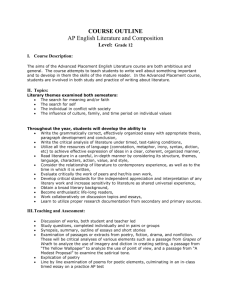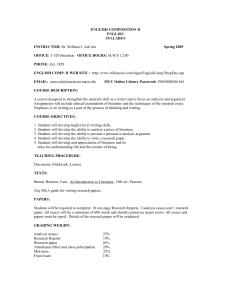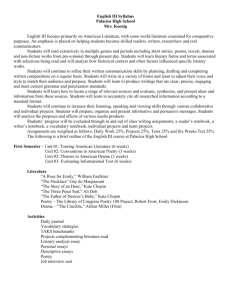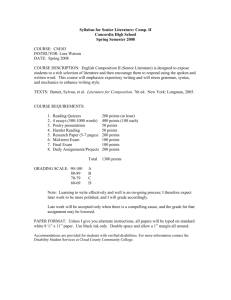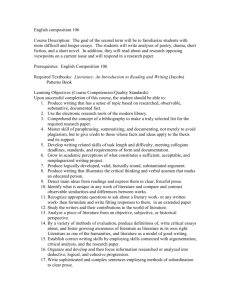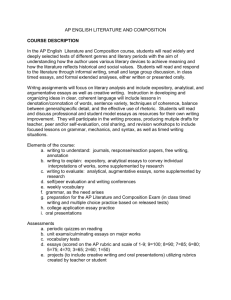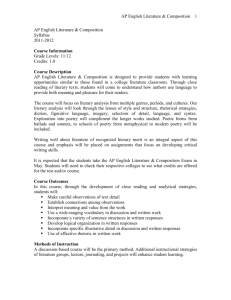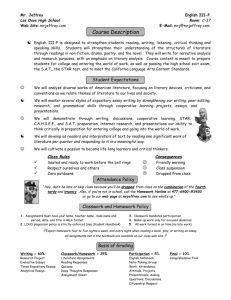File
advertisement
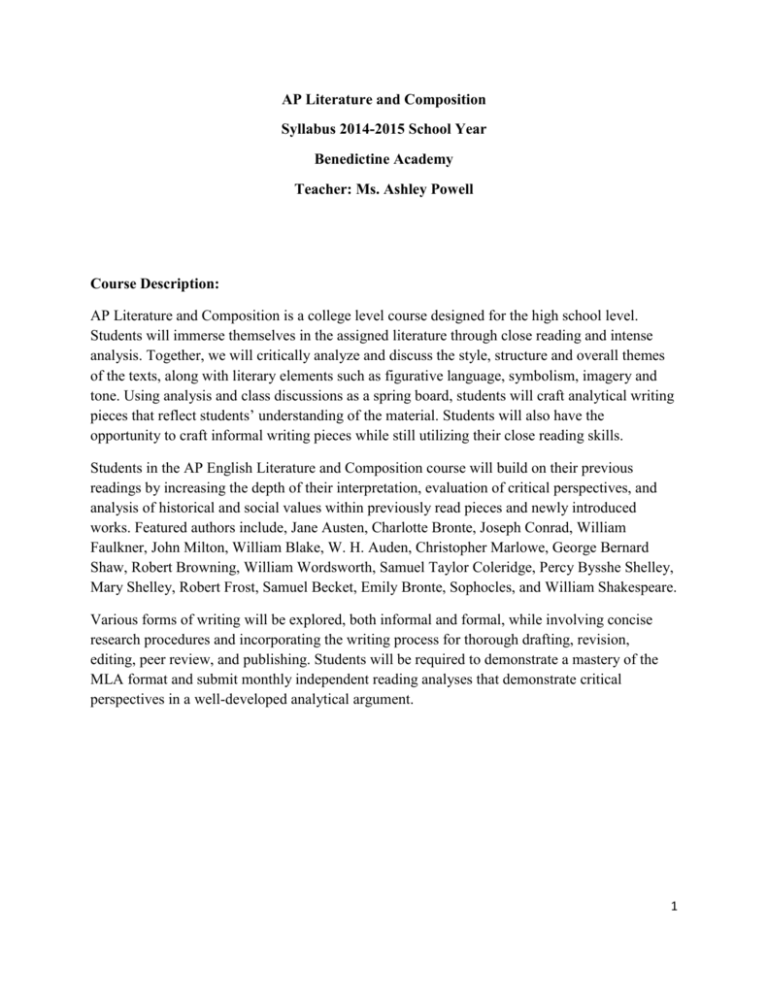
AP Literature and Composition Syllabus 2014-2015 School Year Benedictine Academy Teacher: Ms. Ashley Powell Course Description: AP Literature and Composition is a college level course designed for the high school level. Students will immerse themselves in the assigned literature through close reading and intense analysis. Together, we will critically analyze and discuss the style, structure and overall themes of the texts, along with literary elements such as figurative language, symbolism, imagery and tone. Using analysis and class discussions as a spring board, students will craft analytical writing pieces that reflect students’ understanding of the material. Students will also have the opportunity to craft informal writing pieces while still utilizing their close reading skills. Students in the AP English Literature and Composition course will build on their previous readings by increasing the depth of their interpretation, evaluation of critical perspectives, and analysis of historical and social values within previously read pieces and newly introduced works. Featured authors include, Jane Austen, Charlotte Bronte, Joseph Conrad, William Faulkner, John Milton, William Blake, W. H. Auden, Christopher Marlowe, George Bernard Shaw, Robert Browning, William Wordsworth, Samuel Taylor Coleridge, Percy Bysshe Shelley, Mary Shelley, Robert Frost, Samuel Becket, Emily Bronte, Sophocles, and William Shakespeare. Various forms of writing will be explored, both informal and formal, while involving concise research procedures and incorporating the writing process for thorough drafting, revision, editing, peer review, and publishing. Students will be required to demonstrate a mastery of the MLA format and submit monthly independent reading analyses that demonstrate critical perspectives in a well-developed analytical argument. 1 Course Goals: In the duration of this course, students will be able to: Read and critically analyze different forms of literature such as poetry, dramas, short stories, and novels. Identify the literary strategies used in given texts and how it affects the overall interpretation of the work. Compose weekly informal and monthly formal analytical writing pieces. Evaluate literature using a mature and thorough approach, with well-developed arguments on a regular basis in class and independently. Required Texts: Perrine’s Literature: Structure, Sound and Sense (Eighth Edition). Thomas R. Arp (ed). Sadlier Vocabulary Workshop Level H AP English Literature and Composition Examination (Workbook) Supplementary Texts (Subject to change through the course of the year) Modern Language Association. MLA Style Manual and Guide to Scholarly Publishing, 8th Edition. Khaled Hosseini. The Kite Runner Orwell, George. 1984 Shakespeare, William. Hamlet Shaw, George Bernard. Pygmalion Sophocles. Oedipus the King Wilde, Oscar. The Picture of Dorian Gray ***Please note that supplementary texts must be purchased by students/parents or borrowed from a library and must be presented in class at least two (2) days before the unit of study begins. Our school library carries most of these titles, and you are expected to be prepared with your reading materials on time, without excuse.*** Supplies Needed: One 1 ½” three ringed binder with loose leaf paper and 3 tabbed dividers. One section for do now’s, one for practice tests/times writings, one for DEJs. One folder One flash drive Pens, pencils, highlighters 2 Student Evaluation All students taking the AP English Literature and Composition course are required to take the AP Literature examination in May. Students may NOT opt out of the exam. A midterm and final examination will be given that mirrors the format of the traditional AP exam. Writing Assignments Written projects will include: 1. Various analytical essays composed based on in class readings, discussions, etc, using the writing process (Prewriting, Writing, Revising, Editing, Publishing). These essays will evaluate various literary genres including (but not limited to) short stories, essays, poetry, film, fiction, and drama. 2. Informal writing assignments will also be given at the beginning of each class period, sometimes derived from current events pieces or excerpts from The New Yorker magazine. A class journal is mandatory for these assignments and will be graded intermittently throughout the year. 3. In class essays, quizzes, and tests based on readings, techniques, analysis, etc. All in class essays will be based on previous AP type prompts related to the literature analyzed in class and will be administered in a timed fashion to assist students in completing coherent essays within a 45 minute class period. At least two in class timed essay writing exercises will be completed each week. 4. A final research-based portfolio project. GRADING SYSTEM Participation/Preparedness: (includes journals):10% Homework Assignments: 20% Quizzes /Essays: 30% Tests/Papers 40% 3 Typical Weekly Routine: Please Note: This may change at the discretion of the teacher. Monday- Vocabulary study-focus on novel(s) we are studying Tuesday- In-class writings, AP practice tests, cold analytical readings, TPCASTT poetry practice Wednesday-Focus on novel(s) we are studying Thursday- TPCASTT poetry practice/discussions Friday- Bi-weekly vocabulary quizzes, focus on novel(s) we are studying Tentative Class Calendar- Please Note: This may change at the discretion of the teacher. First Quarter (September 6th through November 5th) Week 1 Summer reading review: The Picture of Dorian Gray. In class journals are required for informal “Do Now” writing assignments at the beginning of the period. Discussion will include an evaluation of the moral ambiguity of Dorian’s character. Will also discuss “The Death of Ivan Ilyich.” A practice AP examination will be given during the first week. Creative projects will be collected at the end of the week. Begin Weekly Tpcastts. Week 2 Summer reading review: Jane Eyre. Students will discuss avoiding plot summary in development of a coherent analysis. Explication Bildingsroman, role of setting/nature on the novel. Unit test using past AP examination format on the novel at end of the week. Reading record cards due. Week 3 The epic tradition in literature (excerpts from Beowulf, The Iliad, Sir Gawain and the Green Knight). Discussion of the epic tradition in modern media (eg, Star Wars, etc.) Outlines/rough drafts of independent reading papers due. Students will peer review one another’s outlines in class and then turn them in for final teacher review. Introduction to turnitin.com. Week 4 Thesis writing review using previous AP examination prompts as a tool to determine how to prepare complete answers to complex prompts. Brief review of Oedipus trilogy. Review dramatic elements for analysis including peripeteia, anagnorisis, and catastrophe. Introduction to Oedipus the King pp. 939. Analysis of the tragic hero. Class project on the components of “tragedy”. First independent reading assignment due (Jane Austen selections; analyze theme and historical context). Week 5 Final week on Oedipus. Unit test on Friday. Updated reading record cards due. In class timed essay writing assignment and practice AP exam questions. Independent reading papers will be returned and peer reviewed via turnitin.com 4 Week 6 Review of Biblical influence on literature. Discussion on the role of the Bible on literary allusion and symbolic meaning. King James’s translation and selected passages for style analysis and critique. Introduction to John Milton’s Paradise Lost. Week 7 Completion of Paradise Lost analysis. Comparison of Miltonian theories on heaven and hell and actual Biblical exposition. Students will also work on developing multiple choice questions using approved stems to analyze question formatting and identify strategies for correctly answering such questions. Week 8 Poetry review/Biblical comparison and analysis (eg, Yeats’ “The Second Coming” pp. 725). Short story selections (eg, Cathedral by Raymond Carver, etc.) Second independent reading assignment due (William Shakespeare selections; analyze theme, setting, allusion and other literary techniques). Peer review via turnitin.com and final teacher comments on both rough drafts and final drafts will be communicated online. Week 9 Shakespeare introduction. Begin in class analysis of Hamlet. Second Quarter (November 9th through January 22nd) Week 1 Continuation of Hamlet discussion. Class projects due. Independent reading of Midsummer Night’s Dream. Week 2 Romanticism in literature. Review of Pope, Keats, Byron, Blake, Coleridge, Wordsworth, Shelley, Browning, Longfellow, Emerson, Bryant). In class timed writing essay analyzing the artistry, technique, and rhetorical devices used in Romantic poetry. Week 3 Continuation of Romanticism in literature. In class analytical essays using previous AP prompts will be administered to demonstrate complexity of analysis and depth of thought. Essays will be peer reviewed via turnitin.com. Week 4 Third independent reading assignment due (Horror selections). Final review of Romanticism. Brief review of Emily Dickinson’s poetry. Updated reading record cards due. Week 5 Victorian literature review. Review of Lewis Caroll’s “Jabberwocky” and poetry by Rossetti, Elizabeth Barrett Browning, Robert Browning, Tennyson, and A.E. Houseman. Introduction to Wuthering Heights. Week 6 Continuation of Wuthering Heights in class reading/project. Explication of Heathcliff as the Byronic hero, role of setting/nature on the novel. (Christmas break) Week 7 Final wrap up on Wuthering Heights. Fiction to film project due upon return from Christmas break. Week 8 Fourth independent reading assignment due (Adjunctive literature). Short story analyses on selected works. In class timed essay writing to evaluate analytical and argumentative essays 5 in which students draw upon textual details to make and explain judgments about the artistry and quality shown in Wuthering Heights. Peer review and teacher review via turnitin.com. Week 9 Midterm Review. Midterm Examination is cumulative to this point and worth 1/6 of your final grade. Third Quarter (February 1st through March 26th) Week 1 Discussion of the Short Story elements and style. Joyce Carol Oates selections. DH Lawrence’s “The Rocking Horse Winner” AP Literature and Composition Course Syllabus Week 2 Discussion of social conventions. Close reading of the short story to discuss language and action throughout. Analysis of themes and literary techniques. (Flannery O’Connor). Week 3 Analysis of the role of women in Charlotte Perkins Gilman’s “The Yellow Wallpaper,” Kate Chopin’s “A Story of an Hour,” and Tillie Olsen’s “I Stand Here Ironing.” Introduction to Ibsen’s Hedda Gabler. In class timed writing essay on aforementioned themes and techniques used in these short stories. Week 4 Character analysis and thematic evaluation of Hedda Gabler. Students will understand the concept of the femme fatale and attempt to comprehend the protagonist’s destructiveness, while examining the social commentary being made from a feminist, Marxist, and Freudian perspective. Students will be required to write an in class essay defending or disputing Hedda Gabler’s classification as a tragedy. Fifth independent reading assignment due (Dostoevski/Tolstoy) Week 5 Introduction to Shaw’s Pygmalion. Analysis of the role of language on society; brief exploration of linguistics. Week 6 Continuation of Pygmalion. Comparison to My Fair Lady. Discussion of film as a relevant literary genre. Week 7 Begin mythology research for modernized myth project. Short story analyses and selected poetry review. Week 8 Final mythology review; presentation of the modernized myth. Sixth independent reading assignment due (Modern literature). Fourth Quarter (March 29th through June 9th) Week 1 Portfolio projects writing intensive begins. Focus on Drama. (Moliere’s Tartuffe). Week 2 Complete Tartuffe. Review tragic/comedic elements in drama. Week 3 Realism in drama: Luiz Valdez’s “Los Vendidos” 6 Week 4 Seventh independent reading assignment due (Consciousness). Review of literary techniques and their use. Week 5 Discussion of the stream of consciousness as a technique in literature. Week 6 Test taking skills review. Multiple choice techniques. Review of Reading Record cards. Practice examinations will be given throughout the week as a preparation tool. AP literature examination on THURSDAY. Week 7 In class debates to support final portfolio project/materials. Week 8 Final exam review. 7
